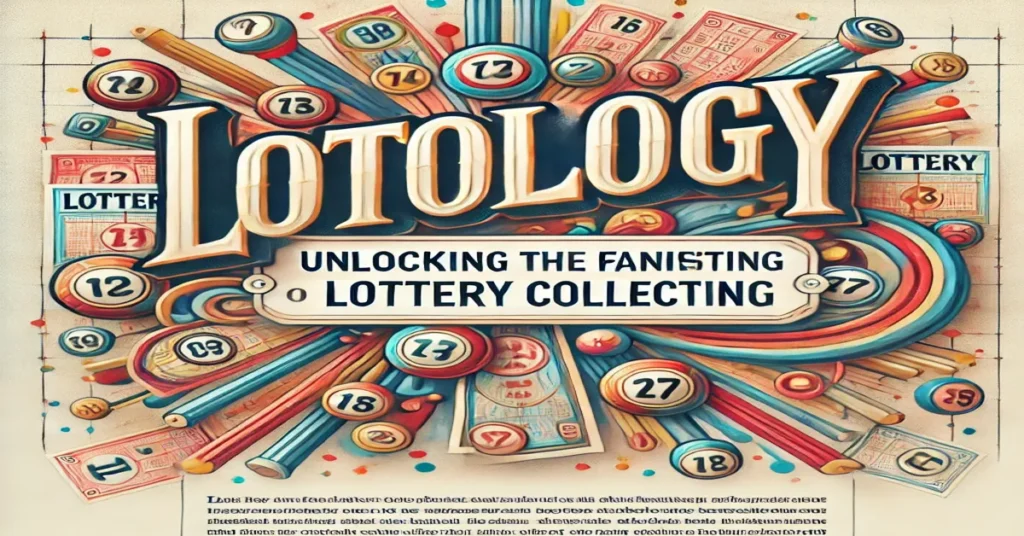Lotology is the study and collection of lottery tickets, a niche but fascinating field that combines aspects of history, mathematics, psychology, and culture. The practice of collecting and studying lottery tickets, akin to philately (stamp collecting) or numismatics (coin collecting), has gained traction among hobbyists and historians alike. While lotteries themselves have a rich and varied history dating back centuries, lotology specifically focuses on the artifacts of these games—the tickets, their designs, their historical significance, and the stories they tell.
In this article, we will delve into the origins and evolution of lotteries, explore the art and design of lottery tickets, examine the psychology of collecting, and discuss the cultural impact of lotteries around the world. By the end, you will have a thorough understanding of lotology and its importance as both a hobby and a means of preserving history.
Origins and History of Lotteries
Early Lotteries
Lotteries have a long history that predates modern society. The earliest recorded lotteries can be traced back to ancient China during the Han Dynasty (205–187 BCE). These early lotteries were used to finance large projects such as the Great Wall of China. Similarly, in ancient Rome, lotteries were a popular form of entertainment during feasts and festivals. The proceeds from these games were often used for public works, such as building roads and aqueducts.
Medieval and Renaissance Europe
Lotteries gained prominence in Europe during the late medieval period. The first European lotteries with monetary prizes were established in the Low Countries (modern-day Belgium, Netherlands, and Luxembourg) in the 15th century. Towns held lotteries to raise money for fortifications and to help the poor. One of the earliest known examples was held in 1445 in L’Ecluse, Belgium.
By the Renaissance period, lotteries had spread across Europe. Queen Elizabeth I of England established the first state lottery in 1569 to raise funds for public projects. The tickets were elaborately designed, and winners received not only money but also valuable commodities such as silver and tapestries.
Modern Lotteries
In the 20th century, lotteries became a regulated industry, with governments worldwide recognizing their potential as a revenue-generating tool. Today, lotteries are conducted in nearly every country, with revenues often funding education, healthcare, and infrastructure.
The Art and Design of Lottery Tickets
Early Designs
The earliest lottery tickets were simple and functional, bearing only the most basic information. As printing technology advanced, tickets began to incorporate decorative elements. The tickets from the 18th and 19th centuries often featured intricate engravings, floral motifs, and heraldic emblems.
Modern Ticket Design
Modern lottery tickets are a marvel of design and technology. They must be both visually appealing and resistant to fraud. Designers use vibrant colors, holograms, and microprinting to create tickets that are both attractive and secure. The incorporation of scratch-off elements adds an interactive dimension, enhancing the user experience.
Collectible Value
For lotologists, the design of a ticket is a significant factor in its collectible value. Limited-edition tickets, commemorative designs, and tickets featuring artwork by famous artists are particularly sought after. These tickets serve as a snapshot of cultural and artistic trends of their time.
The Psychology of Collecting Lottery Tickets
Why People Collect
The act of collecting, whether stamps, coins, or lottery tickets, fulfills a variety of psychological needs. For many, it provides a sense of accomplishment and mastery. Others are drawn to the historical and cultural aspects, seeing their collections as a way to preserve pieces of history.
The Role of Nostalgia
Lottery tickets often evoke a sense of nostalgia. A ticket might remind someone of a special occasion, such as a birthday or anniversary. For others, it may symbolize hope and the excitement of dreaming big, even if only for a moment.
Community and Social Aspects
The community aspect of lotology cannot be overlooked. Collectors often share their finds with others, whether through social media, online forums, or in-person conventions. These interactions provide a sense of belonging and camaraderie.
Lotology and Cultural Impact
Regional Differences
Lotteries reflect the culture and values of the societies that create them. In Japan, for instance, lottery tickets often feature traditional motifs and are tied to seasonal festivals. In contrast, American tickets tend to emphasize bold, dynamic designs that evoke a sense of excitement and urgency.
The Role of Lotteries in Society
Lotteries have a profound impact on society, funding everything from public education to disaster relief. However, they also raise ethical questions about gambling and its effects on vulnerable populations. Lotologists often engage in discussions about these issues, adding a layer of social consciousness to the hobby.
Preserving History
Each lottery ticket is a piece of history. Collecting and studying these tickets helps preserve the cultural and social context of the times in which they were issued. For example, a ticket from a World War II-era lottery might provide insights into how governments used lotteries to raise funds for the war effort.
The Challenges of Lotology
Counterfeiting and Fraud
One of the primary challenges in lotology is distinguishing genuine tickets from counterfeits. Advanced printing techniques and security features have mitigated this issue to some extent, but collectors must still be vigilant.
Storage and Preservation
Lottery tickets are often made of paper, which is susceptible to fading, tearing, and other forms of deterioration. Proper storage—using acid-free albums and protective sleeves—is essential for preserving the integrity of a collection.
Accessibility
Some tickets are extremely rare and expensive, making them difficult for the average collector to acquire. Online marketplaces and auctions have made it easier to find rare items, but they also introduce the risk of scams.
The Future of Lotology
Digital Lotteries
As the world moves increasingly towards digital solutions, traditional paper lottery tickets are being supplemented by digital formats. Lotologists face the challenge of adapting to this shift. Digital tickets, while convenient, lack the tangible qualities that make physical tickets collectible.
Expanding the Community
The internet has played a crucial role in expanding the lotology community. Social media platforms, blogs, and forums provide spaces for collectors to share their passion and knowledge. This increased visibility has the potential to attract a new generation of collectors.
Sustainability
With growing awareness of environmental issues, lotteries are exploring ways to reduce their ecological footprint. Biodegradable tickets and digital solutions are being developed to make lotteries more sustainable. This trend will undoubtedly influence the future of lotology.
Conclusion
Lotology is more than just a hobby; it is a way to explore history, art, and culture through the lens of lottery tickets. From their intricate designs to their role in society, lottery tickets offer a unique perspective on the world. Whether you are a seasoned collector or someone curious about starting a new hobby, lotology provides endless opportunities for discovery and connection.
By preserving these small but significant artifacts, lotologists play an important role in documenting the human experience. As lotteries continue to evolve, so too will the field of lotology, ensuring that this fascinating aspect of our cultural heritage is not forgotten.
FAQs
1. What is lotology?
Lotology is the study and collection of lottery tickets, focusing on their design, history, and cultural significance.
2. Why do people collect lottery tickets?
People collect lottery tickets for various reasons, including historical interest, artistic appreciation, nostalgia, and the joy of collecting.
3. Are lottery tickets valuable?
The value of a lottery ticket depends on factors such as rarity, condition, and historical significance. Limited-edition and commemorative tickets are often more valuable.
4. How can I preserve my lottery ticket collection?
Store tickets in acid-free albums or protective sleeves to prevent fading and damage. Keep them in a cool, dry place to avoid deterioration.
5. What challenges do lotologists face?
Challenges include counterfeiting, storage and preservation issues, and the difficulty of acquiring rare tickets.
6. Is lotology affected by the shift to digital lotteries?
Yes, the move towards digital lotteries poses challenges for lotologists, as digital tickets lack the tangible qualities that make physical tickets collectible.







